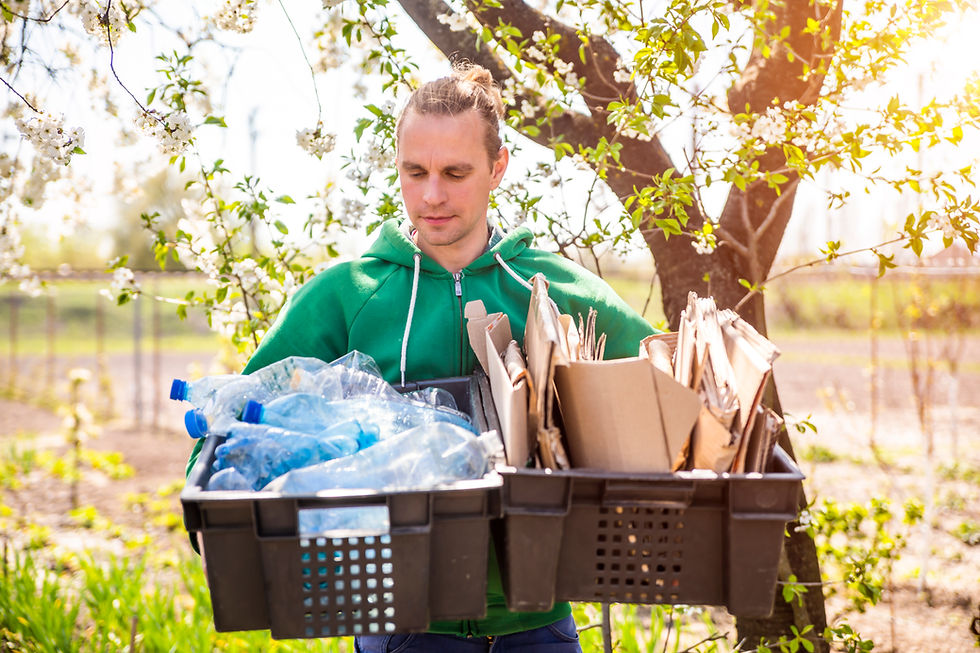Climate Crisis Chaos: Who's At Fault?
- Carrie Martin-Haley

- Feb 28, 2023
- 5 min read

Climate change is a hot button topic right now, and deservedly so. With tensions rising through communities worldwide due to increasingly dangerous weather patterns, drought and water scarcity, lethal natural disasters, and food insecurity, the climate crisis has earned a spot at the table as one of the most significant threats facing current and future generations. And with more and more industries, businesses, and individuals turning their focus to sustainability and our tenuous relationship with the planet, many folks are asking a pertinent question - who is at fault for how we got here?
Corporate or Individual Responsibility?

That proves to be a tricky question. Let’s look at some data: a 2017 report from Groundbreaking Carbon Majors found that over 71% of global industrial emissions from 1988 onward were attributed to just 100 companies, and over half of global industrial emissions could be traced back to just 25 producers. Similarly, only 20 companies worldwide contributed over 50% of single use items thrown into landfill.
Those are some staggering statistics, and considerably overshadow your daily gas-powered car commute to work or the 4.9 pounds that the average American throws in trash daily. So while the initial answer is simple - corporations are responsible for the vast majority of harm to our natural environment - it takes a birds-eye view of our system to comprehensively understand the problem.
Why the Answer is Much, Much More Complicated

Corporations contribute to most of the global air, water, and land pollution placing human and environmental health at risk. Does that mean that individuals are off the hook?
The short answer is no. Our current consumer system in the US is structured to allow for unlimited growth of businesses who provide a product or service that is deemed valuable or necessary to consumers. This means that, by and large, these 100 companies responsible for 71% of carbon emissions are heavily reliant on demand for their product - often provided by smaller businesses or individuals. The problem is nuanced and multi-faceted, and often multiple layers of businesses or corporations are connected to just one massive carbon emitter. But the result, when boiled down to the simplest terms, typically plays out the same way - we, as consumers, have a lot of power.

Take, for example, a leading fast fashion clothing company. These companies create cheap, poor quality clothing produced in emissions-heavy processes and controversial working conditions and sell them to the next tier of purchasers. These buyers may be larger distributors or smaller businesses who sell directly to customers. These direct-to-consumer businesses then sell the clothing to the average consumer who shops online or at brick-and-mortar storefronts - like you or me. As a consumer, if you have the budget and freedom to choose where and how you shop, you can purchase this inexpensive and mass-produced clothing (which sometimes lasts only a few washes before deteriorating) or you can research sustainable clothing brands who place a value - and often a higher price tag - on higher quality pieces of clothing that use cleaner production methods, pay their workers a fair wage, and use fabrics that are better for the planet.
It’s important to note that as consumers in our society, we have both the freedom to choose the products we purchase and engage in the services that we want, and the limitations of what is available on the market and the budgets that we are confined to. For many individuals, making different financial decisions to steer the market is simply out of their reach.

However, for many consumers who have the financial freedoms to make decisions about the types of purchases they make, the opportunities to change the system are abundant. Choosing to purchase more environmentally sustainable products, shop locally, and opt for spending your money at businesses that value their workers drives demand away from the neglectful practices of massive corporations. These individual purchases (or the act of simply avoiding making unnecessary purchases) are what drives system change. In a financial system that is dominated by supply and demand, the demand you place on certain products and practices has the ability to shift entire narratives. You vote with your dollars - and that is an incredibly powerful tool in our society. While corporations may contribute to a significant portion of the climate crisis, everyday consumers can help enact societal change to reframe our values.
So What Can You Do?
While the climate crisis won’t go away overnight and large corporations will likely continue to place profit over environmental health, there are small steps that individuals can take to make a positive impact.
If you have a flexible budget and some time to do a bit of quick research, look up the companies you typically purchase from. Check how the food you place on your table is grown, how your clothing and personal care products are manufactured, and how your bank chooses to invest funds. When you notice a red flag in your buying habits, look up alternative companies to support and choose small businesses or companies that place values on sustainability or ethical manufacturing. Even better - avoid buying unnecessary products when you can. This will help both the planet and your wallet.
Encourage those in your life to engage in different buying practices when possible. When there is more demand for high quality eco-friendly products and transparent business practices, other companies will follow suit.
Connect up with companies you find are not using eco-minded or ethical practices. Write letters, make calls, and sign petitions. Participate in boycotts or local rallies that demand corporate transparency.
Vote! Engage in your local, state, and federal elections to vote for politicians who will hold corporations accountable for their actions and place environmental policy as a priority.
While corporations are responsible for much of the climate crisis, individuals are empowered to shape the market and decide how to spend their time and money. Remember that this type of systemic change comes slowly, so be gentle with yourself and take these adjustments step by step. Together, we can all make a difference.
Shop Sustainably with Us!

Summit Sustainable Goods is a zero waste and refill shop located in Denver, CO that is dedicated to helping you live a more eco-friendly lifestyle at your own pace. We curate sustainable household and personal care products and prioritize small, local businesses when possible. We vet all of our suppliers to ensure that all the products we sell are environmentally friendly and safe for you and the planet. We never push for perfection in the sustainable space (after all, we’re working within a larger system that prioritizes waste first) but encourage our wonderful customers to focus on their progress and feeling inspired to take small steps.
Want to follow our journey and learn about future zero waste events and happenings? Adventure with us by signing up for our email list or follow us on Instagram or Facebook to keep up-to-date on all things Summit.
Much love,
Carrie, Founder
Sources:

Comments